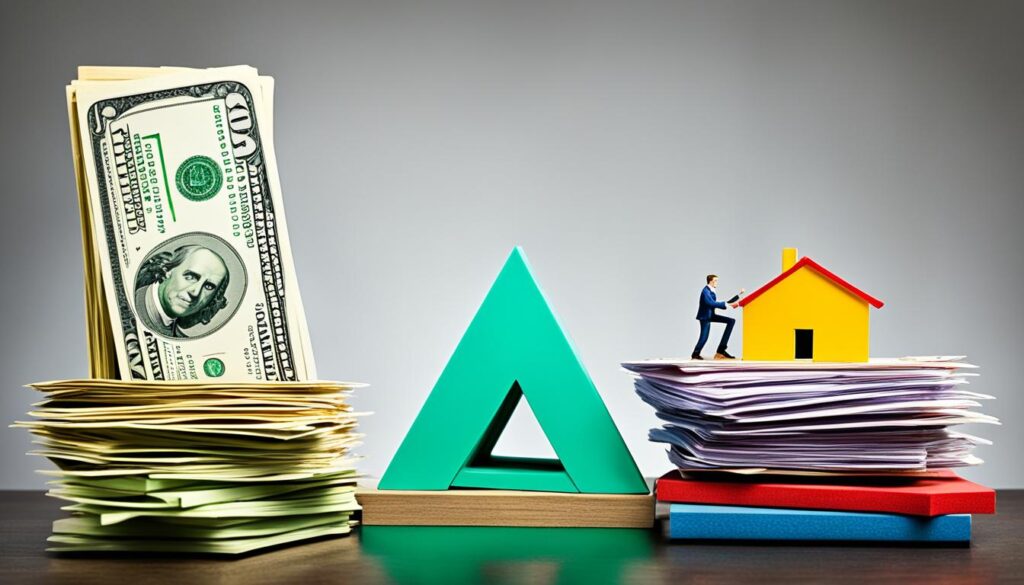Did you know that nearly half of first-time homebuyers reported that student loan debt delayed their ability to save for a down payment, according to a study by the National Association of Realtors1? This striking statistic emphasizes the critical financial dilemma many young adults face today: Should they prioritize saving for a down payment on a home, or focus on repaying student loans? With the average student loan payment sitting at about $203, the significance of this decision is palpable2. Factors such as current interest rates—averaging 5.50% for federal undergraduate loans and up to 15% for private loans—add further complexity to the mix2. As individuals navigate the financial landscape, it becomes essential to evaluate not just personal circumstances, but also broader economic trends, to determine the most strategic path forward in this balancing act of saving for a down payment versus managing student loan repayment.
Key Takeaways
- Understanding your financial standing is crucial in deciding between down payment savings vs. student loan repayment.
- Federal Housing Administration loans require as little as 3.5% down payment, making home buying more accessible3.
- Interest rates on student loans can range significantly, affecting overall repayment2.
- A proper debt-to-income ratio is necessary for securing favorable mortgage terms2.
- Strategies to balance both objectives include budgeting effectively and exploring loan forgiveness programs1.
Understanding the Financial Landscape
The financial landscape is shaped by various elements, with student loan debt and the housing market at the forefront. Understanding these factors can aid individuals in navigating their financial choices effectively.
Current Trends in Student Loan Debt
Recent data indicates a surge in student loan debt among graduates, with many carrying substantial burdens that vary by education level. For instance, bachelor’s degree holders average approximately $29,000 in debt, while medical school graduates can exceed $191,9204. Furthermore, federal student loans are characterized by fixed interest rates and beneficial repayment options compared to the typically higher and less flexible terms of private loans5. As repayments resume in October 2023 after a pause, many borrowers are finding that their debt limits potential savings for a down payment on a home5.
Housing Market Overview
The housing market continues to be a topic of interest with fluctuating prices and interest rates impacting potential homebuyers. Many first-time buyers cite student loan debt as a critical barrier to saving for a down payment, impacting their ability to enter the housing market6. With the rise in home prices, understanding market trends becomes vital for effective financial planning.
The Importance of Financial Goals
Establishing clear financial goals is essential for navigating both student debt and housing aspirations. Individuals should consider allocating their income strategically, such as using the 50/30/20 rule where 50% goes toward needs and at least 20% toward savings, which can support both loan repayment and saving for a home4. Regularly revisiting and adjusting budgets can enhance the alignment of income and expenses, fostering better financial health4.

Down Payment Savings vs. Student Loan Repayment
When exploring the options of down payment savings vs. student loan repayment, understanding the interest rates involved can significantly impact financial decisions. The interest rates for student loans generally remain lower than those of average mortgage rates. Federal loans for undergraduates present an average interest of 5.50% or higher for graduate students7. This introduces a critical factor for individuals deciding on their primary financial focus.
Comparing Interest Rates
In the investment landscape, comparing interest rates between student loans and mortgage options provides valuable insights into potential savings. For instance, an examination of repayment strategies illustrates that prioritizing loans with higher interest rates is often advantageous. A hypothetical scenario comparing a $1,000 loan at 2% with a smaller $200 loan at 6% highlights the importance of paying off the high-interest debt first, which could yield significant financial benefits8.
Impact on Debt-to-Income Ratio
A key metric in assessing financial stability is the debt-to-income ratio, which reflects the proportion of monthly income that goes towards servicing debt. A higher ratio can indicate a higher risk for lenders and limit borrowing potential when the time comes to secure a mortgage. With the current economic conditions leading to many individuals saving for a down payment, alongside those prioritizing their student debt, a strategic approach is critical for maintaining a healthy debt-to-income ratio. Many individuals are deferring homeownership plans due to existing student loans, underscoring the intricate balance necessary to navigate these financial obligations7.

Benefits of Saving for a Down Payment First
Choosing to save for a down payment before focusing on student loans offers numerous financial advantages. Understanding these benefits is crucial for making informed decisions about home ownership.
Potential to Lower Mortgage Costs
A substantial down payment can significantly contribute to lower mortgage costs. By saving adequately, future homeowners can reduce their monthly payments and possibly eliminate the private mortgage insurance (PMI) that accompanies loans with less than 20% down. This insurance often adds substantial expenses to loans, particularly for FHA loans that come with their own insurance premiums, consequently raising total loan costs9.
Equity Building Through Home Ownership
Equity building home ownership becomes more attainable when individuals save for a down payment. Home equity is the difference between the market value of the home and the remaining mortgage balance. As homeowners make their monthly payments, they increase their equity, paving the way for future financial stability. Accumulating equity can also provide a safety net and possible funding for future investments or expenses.
Future Housing Market Considerations
The current landscape suggests that homeowners who have saved for a down payment are better positioned in future housing markets. A strong financial foundation allows them to navigate changes more effectively. For instance, as housing prices fluctuate, having equity can offer more options for refinancing or upgrading to a different home in the future. The benefits of saving for a down payment extend beyond initial home buying, promoting ongoing financial health and security.
Reasons to Pay Off Student Loans First
The decision to prioritize student loan repayment over saving for a down payment involves crucial factors. Understanding the impact of high-interest rates financial health is essential. Student loans can carry interest rates that range from 1% to 13%, significantly affecting financial stability10. When managing a budget, high-interest debts often consume a substantial portion of monthly income, hindering the ability to save for other goals.
Effect of High-Interest Rates on Financial Health
High-interest rates on student loans can lead to long-term financial strain. For instance, a loan with a high rate can result in hundreds of dollars in extra interest payments if not addressed promptly10. The Consumer Finance Protection Bureau recommends a debt-to-income ratio of 36% or less for mortgage borrowers11. Exceeding this ratio due to elevated student loan payments may limit access to favorable mortgage terms.
The Psychological Aspect of Debt Management
Handling debt can evoke stress and anxiety, influencing overall well-being. The psychological aspect of debt management is significant, as high monthly obligations can permeate many life areas, making it difficult to focus on future goals like homeownership. Paying off student loans can alleviate some of this mental burden, providing relief that helps in making informed financial decisions. Emergency savings of 6-12 months of expenses are advisable while managing any debts12.
| Loan Type | Interest Rate Range | Potential Interest Savings |
|---|---|---|
| Federal Student Loans | 2.75% – 8.5% | Up to $2,500 tax-deductible interest |
| Private Student Loans | 1% – 13% | Varies based on refinancing |
| Credit Card Debt | 15% – 25% | Higher returns when paid off first |
Strategies for Balancing Both Goals
Finding effective strategies for balancing both goals of saving for a down payment and paying off student loans can greatly enhance financial stability. Implementing a structured approach allows individuals to manage their finances more effectively and make informed decisions based on their unique circumstances.
Creating a Hybrid Payment Plan
Combining the objectives of saving for a down payment and managing student loan repayments can be achieved with a hybrid payment plan. Individuals may decide to assess their budget carefully, allocating funds to both areas. Typically, it’s advisable to prioritize debt with the highest interest rates while simultaneously building savings. This dual approach can help in leveraging available resources without jeopardizing financial health.
Tips for Efficient Savings
Establishing efficient savings habits can significantly contribute to success. Some practical tips include:
- Setting up an automatic transfer to a dedicated savings account each month.
- Reviewing and adjusting monthly expenses to identify potential savings opportunities.
- Taking advantage of employer benefits such as a 401(k) match to increase overall savings.
As recommended, maintaining an emergency fund of three to six months’ expenses can provide a financial cushion, facilitating the balancing act between paying off loans and saving for future goals13.
Utilizing Loan Forgiveness Programs
Many professionals may benefit from loan forgiveness programs that are available in specific job fields after a designated period of service. Exploring these opportunities can be advantageous for those with significant student debt. Additionally, potential borrowers should consider the total student loan debt in the U.S., which stands at $1.44 trillion, affecting many aspects of financial planning14. Understanding how these programs fit into overall financial strategies can significantly streamline the path to financial freedom.
Conclusion
When deciding between paying student loans or saving for a house, the choice ultimately reflects individual financial circumstances and goals. Currently, with federal student loan interest rates ranging from 3.4% to 3.8%, individuals must weigh their student loan burdens against potential mortgage costs. A balanced approach could enable one to work towards both achieving homeownership aspirations and managing financial goals effectively15.
Understanding the impacts of student loans on debt-to-income ratios is crucial, as these figures can significantly influence mortgage eligibility and rates. With an estimated student loan payment of $220 monthly, long-term strategies, such as increasing payments, could yield significant savings on interest—potentially reaching $3,200 if one adds $200 to their payment16. Conversely, paying off loans may push back home purchases, adding months to the timeline, yet provide psychological benefits as debts diminish.
In light of various factors like current interest trends and housing market conditions, individuals must assess how their choices align with their unique financial landscape. Making informed, strategic decisions is essential for not only navigating debt but also enhancing potential financial well-being in the long run. The key lies in balancing the path towards debt freedom while not losing sight of homeownership goals15.
FAQ
Should I prioritize saving for a down payment or paying off my student loans?
How do current trends in student loan debt affect my ability to save for a home?
What are some effective down payment strategies to consider?
How do interest rates on student loans compare to mortgage rates?
What benefits come from saving for a down payment first?
Why should I consider paying off student loans before saving for a down payment?
What are some strategies for balancing saving for a down payment and paying off student loans?
Source Links
- https://money.com/save-down-payment-or-pay-student-loans/
- https://www.experian.com/blogs/ask-experian/should-you-save-for-a-down-payment-or-pay-off-student-loans/
- https://www.investopedia.com/personal-finance/save-down-payment-or-pay-student-loans/
- https://www.usccreditunion.org/learn/blog/student-loans-budget-your-way-to-freedom/
- https://www.huntington.com/learn/credit-debt/pay-off-student-loans-vs-invest
- https://www.laurelroad.com/income-driven-repayment/saving-on-a-valuable-education-save-vs-repaye/
- https://finance.yahoo.com/news/pay-off-student-loans-save-170011873.html
- https://www.biglawinvestor.com/paying-down-student-loans-vs-down-payment/
- https://www.nerdwallet.com/article/loans/student-loans/save-invest-pay-off-student-loans
- https://www.bankrate.com/loans/student-loans/pay-off-student-loans-or-invest/
- https://www.lendingtree.com/student/pay-off-student-loans-or-buy-house/
- https://www.laurelroad.com/refinance-student-loans/the-pros-and-cons-of-paying-off-student-loans-early/
- https://www.discover.com/student-loans/repayment/finance/pay-student-loans-or-save
- https://pardeeproperties.com/blog/should-you-pay-off-your-student-loans-or-save-for-a-down-payment/
- https://www.bogleheads.org/forum/viewtopic.php?t=410411
- https://smartasset.com/financial-advisor/pay-off-student-loans-or-invest

